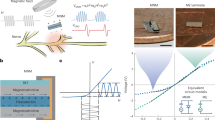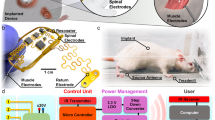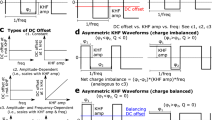Abstract
IN recent years, the attention of control engineers has been attracted to the communication characteristics of nerves, particularly in regard to their function in the feedback control of muscle. Muscles are highly non-linear power amplifiers, which require complex nervous control circuitry to permit smooth and continuous movement of the limbs. This control circuitry consists of multiple feedback loops, and the problem is to determine experimentally the function of individual loops. One approach is to open circuit specific peripheral neural paths and observe the effect on over-all performance.
This is a preview of subscription content, access via your institution
Access options
Subscribe to this journal
Receive 51 print issues and online access
$199.00 per year
only $3.90 per issue
Buy this article
- Purchase on Springer Link
- Instant access to full article PDF
Prices may be subject to local taxes which are calculated during checkout
Similar content being viewed by others
References
Hodgkin, A. L., and Huxley, A. F., J. Physiol., 117, 500 (1952).
Tasaki, I., Handbook of Physiology, Sec. I: Neurophysiology, 1, 75 (Amer. Physiol. Soc., Washington, 1959).
Author information
Authors and Affiliations
Rights and permissions
About this article
Cite this article
TANNER, J. Reversible Blocking of Nerve Conduction by Alternating-Current Excitation. Nature 195, 712–713 (1962). https://doi.org/10.1038/195712b0
Issue Date:
DOI: https://doi.org/10.1038/195712b0
This article is cited by
-
Kilohertz-frequency interferential current induces hypoalgesic effects more comfortably than TENS
Scientific Reports (2023)
-
Effects of waveform shape and electrode material on KiloHertz frequency alternating current block of mammalian peripheral nerve
Bioelectronic Medicine (2022)
-
Cellular mechanisms underlying state-dependent neural inhibition with magnetic stimulation
Scientific Reports (2022)
-
Stabilization of Weakly Unstable Fixed Points as a Common Dynamical Mechanism of High-Frequency Electrical Stimulation
Scientific Reports (2020)
-
Reduction of the onset response in kilohertz frequency alternating current nerve block with amplitude ramps from non-zero amplitudes
Journal of NeuroEngineering and Rehabilitation (2019)
Comments
By submitting a comment you agree to abide by our Terms and Community Guidelines. If you find something abusive or that does not comply with our terms or guidelines please flag it as inappropriate.



